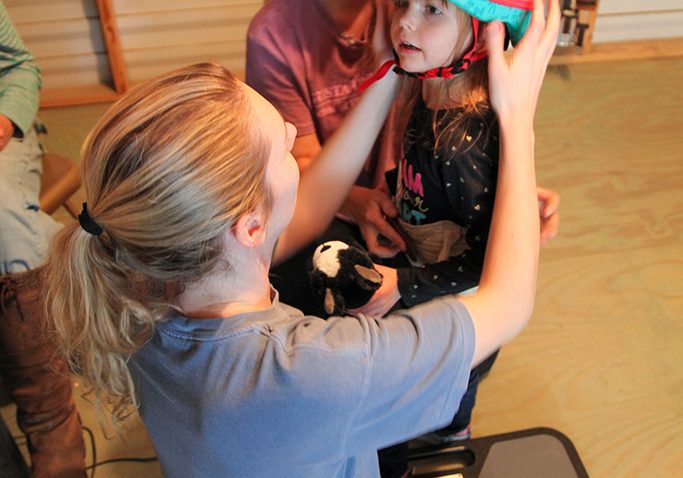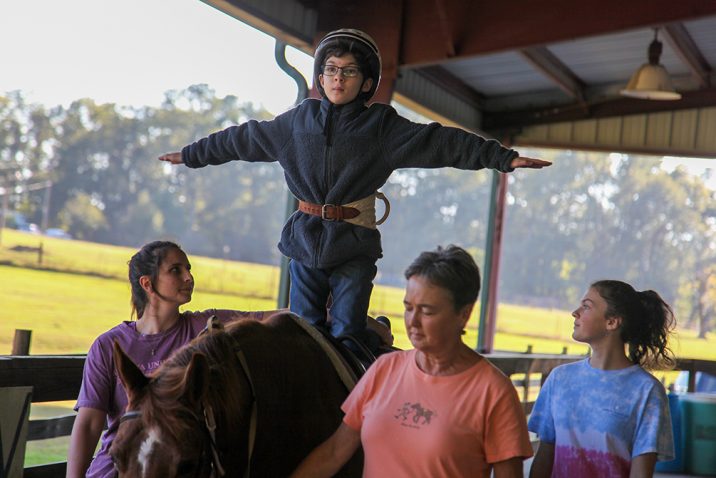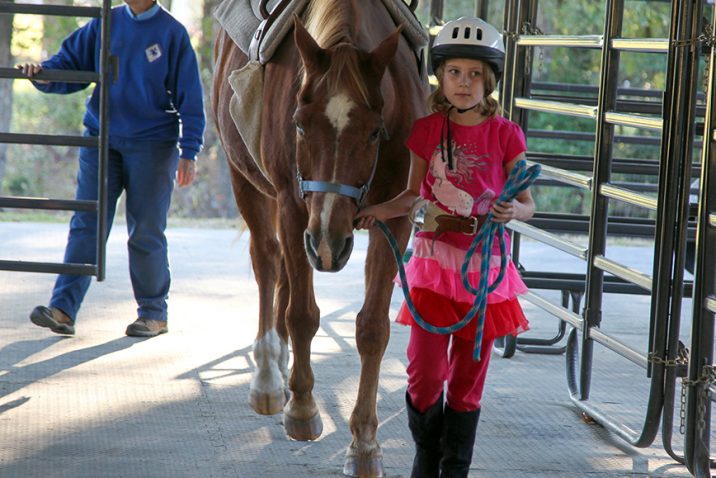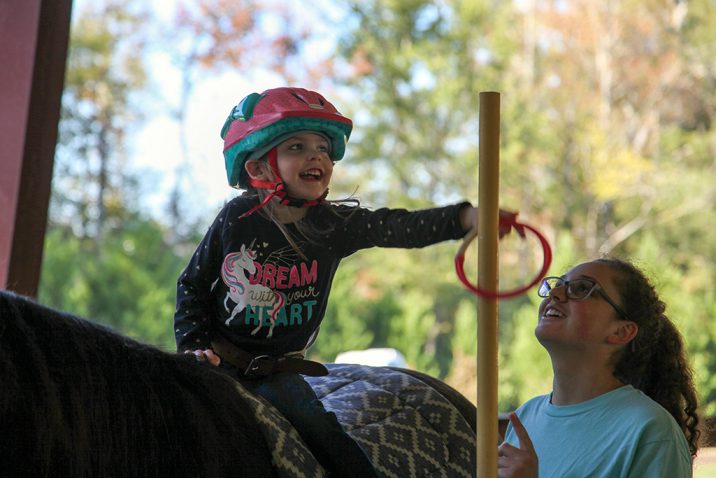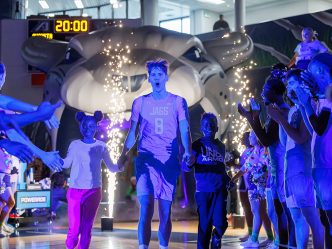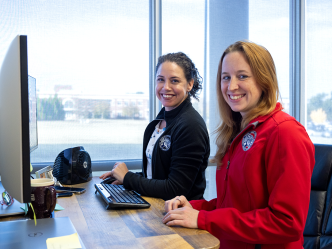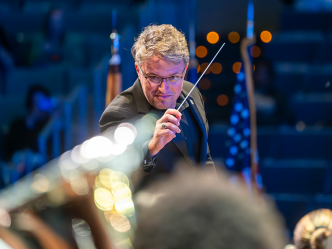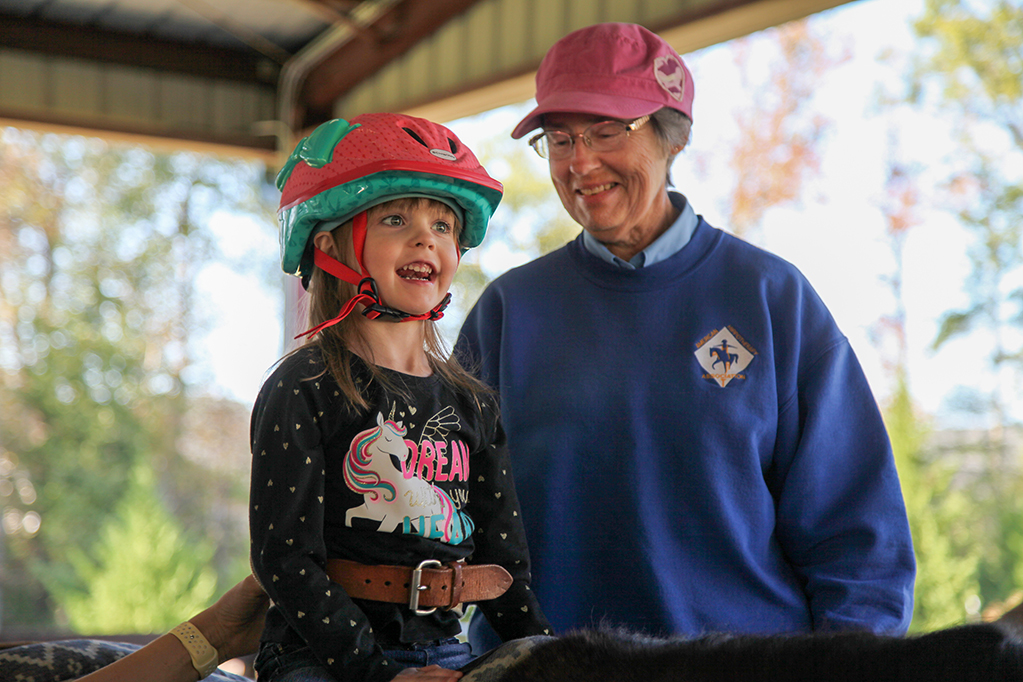
Nestled off a dirt road in Grovetown, Georgia, sits Maple Knoll Farm, where four volunteers are preparing Peppy, Daz, Benjamin Carter and Lancelot for afternoon therapy sessions.
The four horses, however, are not the patients. They arrive later in the day, usually at intervals of 30 to 45 minutes, to take part in hippotherapy with Blue Ribbon Riders. The organization’s programs are designed for children and adults with special needs while also training therapists in the practice of hippotherapy.
Hippotherapy is treatment with the help of the horse. It is a strategy used by occupational therapy, physical therapy and speech language pathology professionals to promote function in patients with sensory processing, cognitive and neuromotor conditions.
Claudia Morin graduated from the Medical College of Georgia in 1980 with a master of health education and occupational therapy. While serving on the faculty in the OT Department of the School of Allied Health Sciences at MCG, she was approached by United Cerebral Palsy of the CSRA to start a therapeutic riding program. In 1982, Special Equestrians of the CSRA was created. The program started with one horse and four children at Horse Creek Planation in Edgefield County, South Carolina.
In 1995, Special Equestrians of the CSRA was dissolved and Blue Ribbon Riders Inc. was established as a 501(c)(3) nonprofit organization. The program operated in Augusta on the property owned by Dr. Patricia Hartlage, a pediatric neurologist at MCG, until it was relocated to Maple Knoll Farm in 2003. When that move was made, Blue Ribbon Riders was created as a 501(c)(3) nonprofit organization.
“If we were going to run the program, we had to start it as a nonprofit,” Morin said. “It was created in 1995 and we were at two locations, Flowing Wells Road and Evans to Lock Road until I moved it to my own property in 2003.”
Morin grew up caring for horses and riding in shows and on trails. She is a PATH Intl. certified riding instructor and a hippotherapy clinical specialist with the American Hippotherapy Association (AHA). She is a founding member of AHA, serving on its board and teaching numerous courses in hippotherapy to therapists in the United States and abroad.
“We are under the National Organization for Therapeutic Riding and we follow the standards that are established for therapeutic riding programs,” Morin said. “We’ve been very active with the American Hippotherapy Association and involved with teaching the hippotherapy workshops around the country that train PTs and OTs to do this.”
Blue Ribbon Riders is a member center of PATH Intl. and follows the national standards established by PATH Intl. for equine assisted therapy programs and activities.
Work in progress
Heather Hughes has been bringing her daughter, Summer, 4, to Blue Ribbon Riders for three semesters now. The family doesn’t have a definitive diagnosis of Summer’s condition, but she has weak muscle tone in her limbs and core, which has led to some cognitive issues like speech delays.
Hughes has seen a dramatic improvement in Summer during the brief time she’s been attending.
“Her coordination has improved and she’s strengthened through her core and legs, because her leg muscles were really tight. So riding the horse and then moving has straightened those muscles so they’re not so tight,” Hughes said. “She’s able to kind of let go and feel comfortable. With riding the horse, it activates the speech centers, so we’re finally getting some vocalizations. And her attention span has gotten better.”
Summer was very apprehensive when she was first introduced to the horses. But after a few minutes of working with Morin, she settled down and was able to participate in the program.
Hughes first began working with Morin with her older son, who is autistic. However, they had to stop treatment because he had allergies. When her daughter started having problems, she immediately got back in touch with Morin. Hughes is happy with what hippotherapy has done for Summer as well as how much Morin and her volunteers stress safety in the participation.
“I’m amazed at what this program is doing because it’s OT, PT and speech, all together in one beautifully fun thing,” she said. “Most special needs kids don’t get opportunities to do the normal things kids get to do. So this is awesome.”
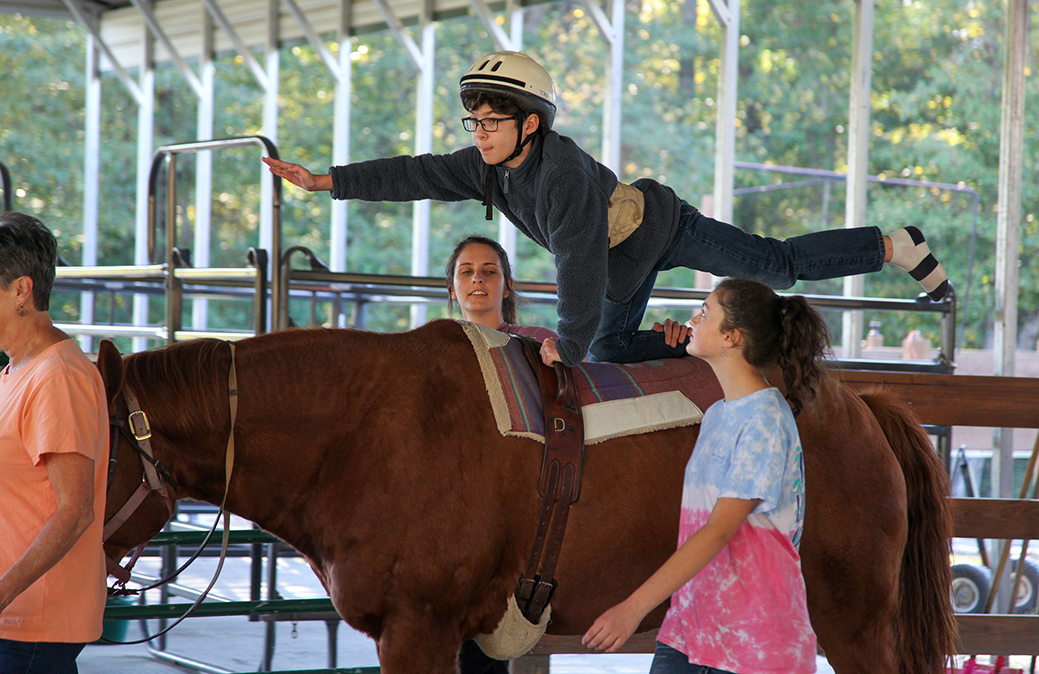
Helping fight the good fight
The volunteers help Morin before each session, grooming the horses, feeding them and cleaning out stalls.
Cindy Steele loves horses. She owned one early in life but had to sell it when she got married because “my husband couldn’t afford the both of us.”
She has been a volunteer with Blue Ribbon Riders for the past 11 years. She had been working and volunteering as a teacher, but when she retired, she was looking for a way to continue working with children.
“This was a perfect match,” she said. “I’ve always liked to work with kids. Here, I get to volunteer for 10 weeks and then I get to ride for 10 weeks to help exercise the horses.”
During her time helping, she has been able to see plenty of progress in the patients helped by Blue Ribbon Riders.
“Because I’ve been here for 11 years, I’ve really gotten to see change because change is slow,” Steele said. “I’ve seen kids that don’t talk at all and they get on top of a horse and just start talking away. It just brings a lot of joy to them. I’m blessed to be here.”
The other three volunteers this semester are siblings, sisters Olivia and Naomi Sharp and their brother, Chase Calhoun.
Olivia, 14, and Naomi, 15, have been volunteering for the past year while Joshua, 13, was able to join them this semester. Morin likes her volunteers to be at least 13 years old. The girls became involved after their mom saw Blue Ribbon Riders on Facebook and thought it would be something good for them to do outside of their homeschool learning.
While Olivia had some experience working with horses, Naomi did not, but they’ve both been able to learn from Morin the proper way to work with the animals. In the process, they’ve had a great experience working with the patients who come through as well.
“It’s been awesome for me, I really enjoy it,” Olivia said. “I like seeing the kids and how they develop, and how they get better from how they were (when they started).”
“All the kids have been fun to hang out with and work with,” said Naomi, who, like her sister, sees a career in medicine in her future.
As for Chase, he was excited to turn 13 so he could start volunteering at Blue Ribbon Riders.
“I couldn’t wait until I could start. I like hanging out with kids, especially special needs kids,” he said.
Hands-on experience
Dr. Lori Bolgla is a professor in physical therapy at Augusta University and has been friends with Morin for 30 years. She is a firm believer in the work Morin is doing with hippotherapy and incorporates the research and training opportunities for AU students into the curriculum.
“I just saw it as an opportunity because I knew we need the doctor of physical therapy students to have good projects and I was trying to think of something that could incorporate service learning as well as meet curricular requirements,” Bolgla said. “So I started having students come out here to start their research, and they love it because it shows them how they can incorporate clinical research in a nonconventional setting. It teaches them responsibility and all of the students that come out here take charge of the project.
“Claudia is an occupational therapist, and she can also teach them the clinical decision-making behind the choice of intervention strategy,” Bolgla added. “Everything is tailored to the kids to meet their needs. The one thing that’s challenging with this type of research is that your subjects are diverse, so we have to find a research design while meeting each subject’s needs. It’s a little bit like bringing the laboratory to the field. It also allows our students a unique experience with interprofessional education and collaboration.”
Jennifer Vasiloff and Bethany Toney Moore are second-year students in the PT program at AU. Vasiloff said she wanted to participate in Bolgla’s research project because it was already established and it gave her a chance to work with children.
“I’ve learned a lot about what hippotherapy entails, because it’s not something that’s specifically taught in the physical therapy program,” Vasiloff said. “There’s a lot of incorporated movements that they use and it’s not just the motion of the horse, which is what I previously thought. There’s a lot of activities involved and different adjustments for different kids depending on their disability and diagnoses.”
Moore liked the idea of being able to work with children and though she grew up on a farm surrounded by horses, she had never seen them integrated into physical therapy.
“I really sought out the opportunity whenever I saw it on the list because I am really interested in the pediatric route for physical therapy. So I saw this as an opportunity to integrate both parts,” Moore said.
Vasiloff and Moore each walked away with a different life lesson from the project.
“I learned how to be adaptive with people you’re working with because every kid is different,” Vasiloff said. “I think exposure is key with a lot of professions, especially allied health. You can learn as much as you want in the classroom, but you never really put it all together and know what you’re doing until you’ve experienced it in person. I’m happy I have the opportunity to get this exposure, getting to work with this population and in this setting. And so I can already see ways that I would be able to apply it on my rotations later, and my third year and as a working professional.”
“I think this is truly amazing … just being here for 10 weeks and seeing how much progress the kids make, and how they can go from being afraid of a horse to not,” Moore said. “Being able to be at an outdoor arena, get my research credit and have so much fun with the kids — it doesn’t even feel like school but I am learning so much from this opportunity.”
Bolgla says the hands-on learning, especially when it comes to therapy, is important.
“This is real world, it’s not scripted,” she said. “When you come out here, you have no idea what you’re going to encounter.”
Benefiting all involved
Morin said the volunteers learn by the fourth or fifth session, whether they have prior experience with horses or not, how to safely interact around the horses.
“They’re paying attention to the horses in the ring, how they are interacting with the kids and I end up giving them more responsibility for working with the riders as they go along,” Morin said.
She also said it was important to emphasize Blue Ribbon Riders’ mission statement of providing an opportunity for special needs people to interact with horses, but also provide educational opportunities for therapy students to learn about hippotherapy.
“I like to seek out volunteers from Augusta University because I want the students to learn about and experience this realm of practice,” Morin said.
The overall purpose of Blue Ribbon Riders is something Morin holds close to her heart. Whether the patient has a physical disability, emotional anxiety or motor coordination issues, she has seen how the bond between a patient and a horse offers a one-of-a-kind experience.
The therapists overlay appropriate activities to help patients improve their posture and attention span as well as help them to increase self-confidence and to participate fully in the experience.
“The horse provides a lot of movement that is in a three-dimensional plane that causes your pelvis to move in a similar manner as how the pelvis moves when we walk,” Morin said. “This repetitive movement helps to improve balance, posture, mobility and functions.
“Some of the older patients, that have less physical disability but more mental health issues, spend time grooming and interacting with the horses on the ground either before or after the mounted session,” she said. “The sensory input they get from patting and touching the horse and responding to the horse is giving them feedback about themselves. So that’s a big part of the horse in terms of how the horse helps us with the cognitive and emotional and psychological piece.”
For information about Blue Ribbon Riders, email Claudia Morin or call (706) 854-0644.
 Augusta University
Augusta University
